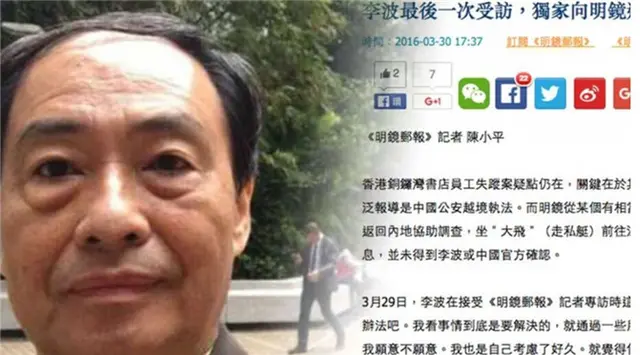The key player in Hong Kong’s bookseller mystery has given his longest and widest-ranging interview to date.
Despite his earlier pleas for privacy, Causeway Bay bookseller Lee Po has given a fresh account of his disappearance and the fate of his colleagues that raises more questions than answers.
In the telephone interview with New York Chinese-language media outletMingjing News, Lee was hesitant and evasive about key details of his return to mainland China despite being offered opportunities to clarify the situation and dispel fears that he was kidnapped.
The bookseller vanished from Hong Kong last December and later surfaced on the mainland, then returned to Hong Kong last week and told local authorities that he did not require any police or government assistance. The same requests were made by his two associates – Cheung Chi-ping and Lui Por – when they returned to the city earlier this month after disappearing last October.
Lee toldMingjing Newshe went back to the mainland illegally because three of his staff members were in trouble there. He did not say what kind of trouble, and was not specific on which employees needed assistance.
When he was on the mainland, Lee realised his associate Gui Minghai was also in trouble, and ended up helping with an investigation into the latter. Gui is a writer and co-owner of publishing house Mighty Current.
Lee said: “I was trying to solve my employees’ problems. [Because] the boss should be responsible for them ... but also because they hurt the company’s business. I felt it was my duty to help them out.”
When asked who assisted him in “sneaking” back to the mainland, Lee responded: “I was willing to go. Who accompanied me, I do not have to say. Whoever it involves, [naming them] impacts others. Sorry.”
He subsequently claimed that “a friend” arranged his cross-border movements, but did not say if he made the journey by boat or car. He also did not explain why he did not cross the border legally using his home-return permit. There are no official records of him leaving the city.
Noting that before Lee went back to assist with the investigation, he had told an international media outlet that he could not return to the mainland, theMingjingreporter asked if he had been afraid.
Lee said he had been a little scared but, as the boss, and as the situation was “dragging on”, he went back hoping to be able to help solve the problem.
On the status of his fellow booksellers, Lee said bookstore manager Lam Wing-kee, one of three people mainland authorities had promised to release on bail, had not returned to Hong Kong because his family was on the mainland.
Lee told the media outlet that Cheung and Lui were out on bail but did not disclose more information because “they have the right to liberty”.
Gui, despite having been paraded on Chinese state TV, and Lam have not emerged publicly.
Lee also confirmed his decision to give up his British passport, but said that he had not started the process. He ruled out emigrating with his family, mentioning he had a son with autism, and said he wanted to live in Hong Kong.
Meanwhile, ahead of a US-led nuclear security summit, a bipartisan US congressional committee on China has urged President Barack Obama to press his Chinese counterpart Xi Jinping on “the marked deterioration” in human rights and the rule of law since Xi became president.
The committee, including co-chair Marco Rubio, who recently suspended his US presidential campaign, expressed concern about the bookseller case and the arrest of foreign citizens, including US citizen Sandy Phan-Gillis.
The committee said these were issues that raised questions about China’s commitment to its promises to ensure “a high degree of autonomy” for Hong Kong and the safety of Americans doing business in China. It also urged Obama to present the Chinese president with a “priority prisoner list”.
(SCMP)
 简体中文
简体中文

